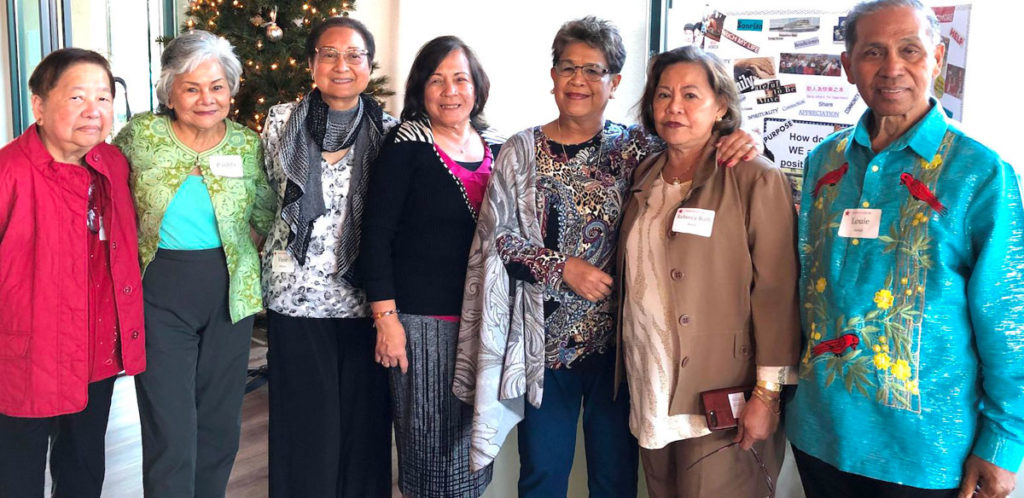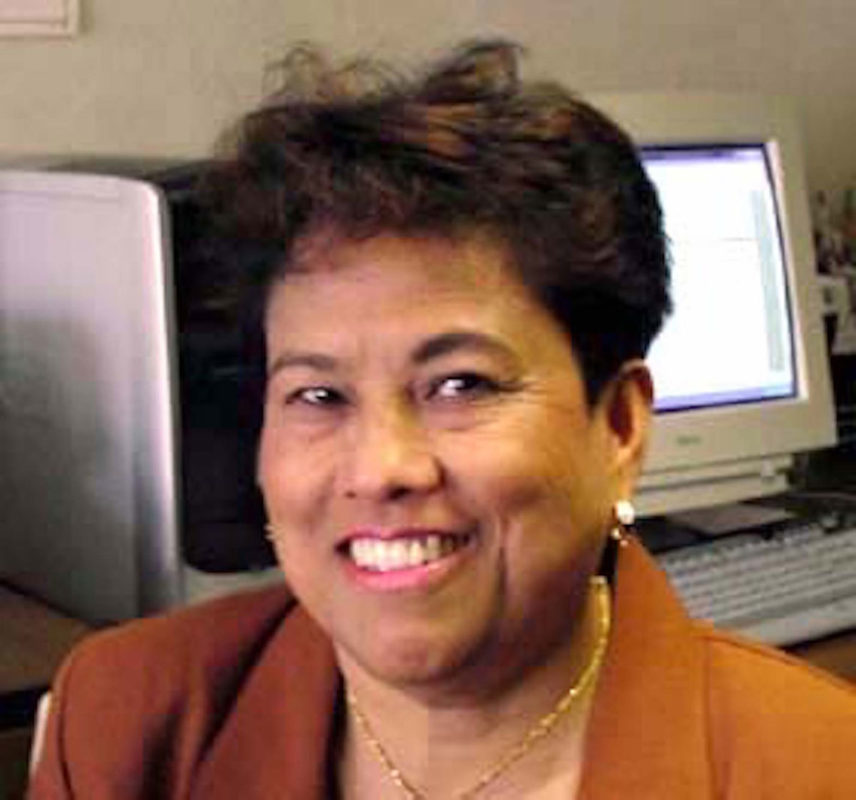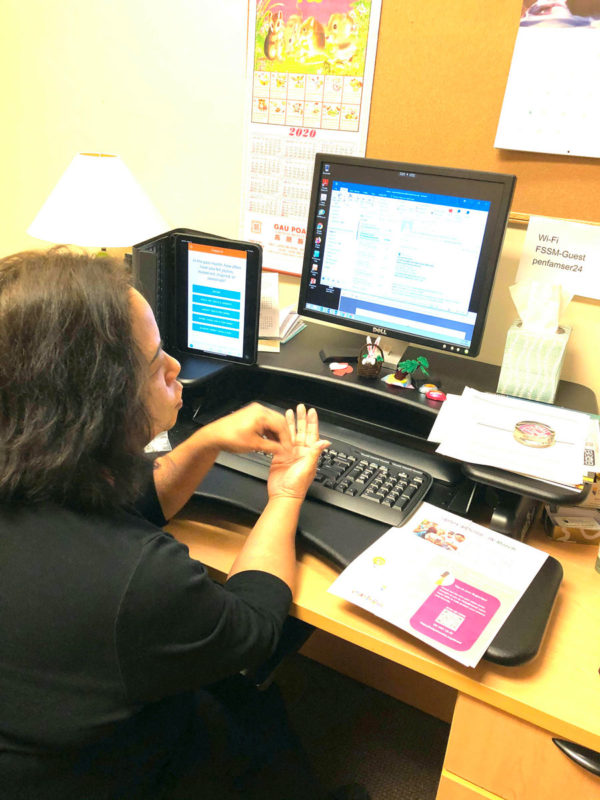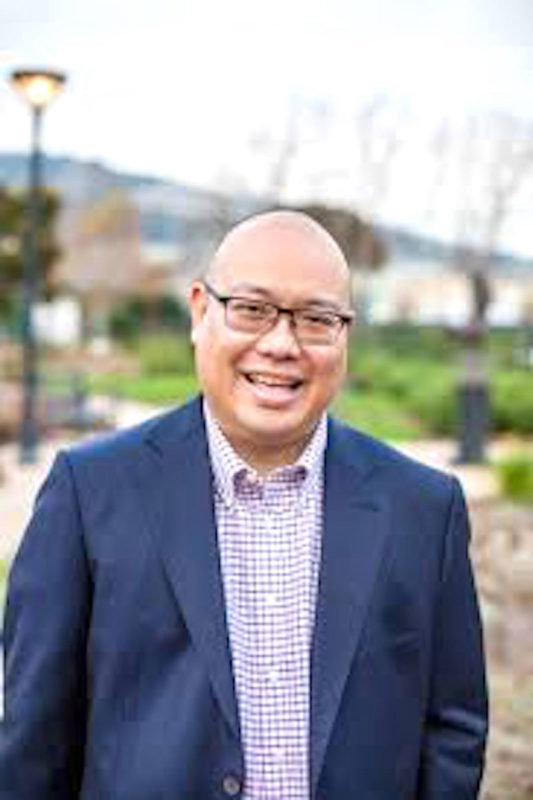How Fil-Am seniors stay connected as centers close due to virus

Filipino senior peer volunteers have a common tool to connect with their clients, say their coordinator Tessie Madrinan (center). INQUIRER/Cherie M. Querol Moreno
DALY CITY, California — When she retired from her 50-year career as a social worker, Monica Abello stayed active. She did not drape herself on a lounging chair with a hat and sunglasses waiting for the sun to set and the moon to rise. No one expected the first known Filipina in San Mateo County to earn a license as a clinical social worker to switch gears.
Nearly 85, the Daly City resident volunteers along with other retirees at HART or Healthy Aging Response Team, a program of the nonprofit Daly City Partnership that connects older adults and people with disabilities to services available throughout the county.
In English, Tagalog and Visayan, she gives an ear and a shoulder to contemporaries with certain needs: food, home care, transportation. Sometimes the caller just wants to be heard, and Abello is happy to listen.
She can relate to program participants’ situations. People who end their professional lives start missing their former routine. Older newcomers in this country feel excluded because of cultural and language barriers. Isolation is a main factor affecting the well- being of older adults everywhere and the motivation for nonprofit agencies’ services and community centers’ activities for the specific sector.
Post-retirement, Abello has been taking tai-chi and folk dancing at the Pilipino Bayanihan Resource Center, the organization she co-founded in the early 1980s with lawyers, faith leaders and other advocates for Filipino immigrants.
Occasionally she would partake of congregate meals at Doelger Senior Center, where a balanced lunch subsidized by the County costs her around $3.50 and a guest under the age of 60 a bit more. On Wednesdays she may attend Kapihan, the weekly gathering hosted by the Filipino Senior Peer Counseling Program of Peninsula Family Service at Lincoln Community Center.
City and private programs have given Abello and contemporaries a new regimen that gives them purpose and social interaction. But not these days. In fact Abello has been on self-quarantine per urging of her daughter, a nurse at Stanford Medical Center.
The current world health crisis wrought by the coronavirus has forced closure of community centers to prevent any kind of exposure. That means older adults, the most vulnerable to the respiratory illness causing the pandemic, will be deprived of services aimed at freeing them from isolation.
Abello lives in North San Mateo County, which comprises Brisbane, Colma, parts of South San Francisco and San Bruno, and Daly City, the county’s largest city with over 110,000 residents. North County has the highest number of low-income older adults, according to the 2010 Census.

Pioneer Fil-Am social worker Monica Abello, 84, will keep herself busy during her self-quarantine. CONTRIBUTED
Daly City Mayor Glenn Sylvester on March 13 in the city website issued protocols and temporary closures to “slow the number of cases of COVID-19 so that our medical system is not overburdened.”
“All City facilities such as community centers, clubhouses, restrooms, playgrounds, sports courts, parks and open space facilities are closed to the public,” the statement stressed.
All branches of the city library system, a haven for older adults and pre-school children, will be closed from Monday, March 16.
Ann Cooney, Senior Services Supervisor at Doelger Center, confirmed to Inquirer.net that effective March 13 “classes and activities including private rentals” have been “suspended except for congregate meals that are offered to-go.” Vice Mayor Juslyn Manalo noted that lunch pick up observes the social distance while continuing to serve those who rely on the program.
Pioneer FilAm community leader Fran Guevara likewise confirmed that Magnolia Community Center, the hub of services for older adults in South San Francisco, is closed until Monday, April 6. Lunch until then is canceled as well. Guevara, South City recreation services coordinator, had earlier announced that the popular annual Senior Health Fair at the Municipal Services Building had been cancelled for the first time since its premiere 23 years ago. For the same reason.
“I think we’ve made the best decision based on information from the county,” said South San Francisco City Council Member Mark Nagales, who spoke to Inquirer.net after a conference call of election officials with the county health office.
“As a son I know how important social interaction is for my parents so I understand how closing the senior center would affect participants. But the County Health Officer has recommended closure as the best form of prevention. At this point we have 20 confirmed cases in San Mateo County, still lower than neighboring counties. We want to mitigate the problem by following the county officer.”
Better safe than sorry is the mantra.

Help@Hand specialist Arlene Aquino explains how she prepared older adults for a coming free new lifeline. INQUIRER/Cherie M. Querol Moreno
San Bruno Senior Center temporarily shut down March 7 after learning that 3 passengers on the Grand Princess cruise ship quarantined in Oakland for multiple cases of coronavirus infection had visited the site to assist with its lunch program. One of the volunteers was reported to have low-level cold symptoms now past and the other two reported no symptoms.
The City of San Bruno heeded the updated advisory from the San Mateo County Health Officer for “cancellation of all non-essential public gatherings” now that he has “evidence of widespread community transmission” in the county.”

South San Francisco Council Member Mark Nagales says he empathizes with older adults unable to engage while community centers are temporarily closed. CONTRIBUTED
The center is open for “modified” activities. All programs are cancelled through March 25 except for tax preparation and lunch service at the center but “strongly suggested” to be “taken home rather than eaten on the site.”
The community center at Pacifica, south of the coast from Daly City, will keep its lunch available in-house with tables far apart, said Terri of the Senior Services Department.
Technology, the bane of folks born before 1969, has turned out to be the savior in this period of isolation.
“We know the suspension of in-person meetings and one-on-one counseling will be detrimental to our participants and clients,” conceded Tessie Madrinan, who coordinates the PFS Filipino Senior Peer Counseling program. “Our volunteer peer counselors say they’ll miss the camaraderie but they understand and look forward to the center reopening.Luckily we can conduct meetings by telephone, either landlines or cellphones. It’s not the same as speaking to each other face-to-face, but it’s the safest alternative at this time. ”
Arlene Aquino knows so for a fact.
Specialist of PFS’ Help@Home program, Aquino has been training residents of centers and independent living and other facilities for older adults to familiarize them with technology, particularly their cellphones. Since July last year, she has been teaching retirees and people over the age of 55 about accessing resources for their health and well being.
“We call the trainings ‘Appy Hours,’” said Aquino, who admits to being inseparable from her I-Phone. “This program funded by the San Mateo County Behavioral Health & Recovery Services sets the stage for the upcoming launch by the State of California of a free app. The app will give users access to tools for dealing with issues such as anxiety, depression, and yes, isolation.”
The coming app would be a boon to Abello and her peers. For now, she said she”ll turn her attention to housework because HART, where she volunteers, is housed in Doelger Senior Center .
“There’s so much I’ve deferred because of all my social activities,” she said with a laugh. “I can plan my 85th birthday, which is coming in two months.” By then she hopes like everyone else that the COVAD-19 threat will be history.

